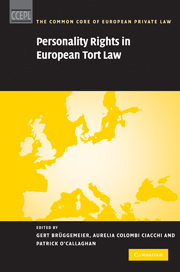Book contents
- Frontmatter
- Contents
- List of contributors
- National reporters
- General editors' preface
- Preface
- Editorial note
- List of abbreviations
- Part I Mapping the legal landscape
- Part II Case studies
- 4 Case 1: The corrupt politician
- 5 Case 2: Convicted law professor
- 6 Case 3: The paedophile case
- 7 Case 4: An invented life story?
- 8 Case 5: A former statesman's family life
- 9 Case 6: A satirical magazine
- 10 Case 7: A snapshot of a person
- 11 Case 8: A paparazzo's telephoto lens
- 12 Case 9: Naked.Little.Girl.Com
- 13 Case 10: The late famous tennis player
- 14 Case 11: The popular TV presenter
- 15 Case 12: Copied emails
- 16 Case 13: Brigitte's diaries
- 17 Case 14: Tape recordings of a committee meeting
- 18 Case 15: ‘Light cigarettes reduce the risk of cancer’
- 19 Case 16: Doctor's non-disclosure of a foetal disease
- 20 Case 17: WAF – A gang of incompetents?
- Part III A common core of personality protection
- Index
9 - Case 6: A satirical magazine
from Part II - Case studies
Published online by Cambridge University Press: 06 July 2010
- Frontmatter
- Contents
- List of contributors
- National reporters
- General editors' preface
- Preface
- Editorial note
- List of abbreviations
- Part I Mapping the legal landscape
- Part II Case studies
- 4 Case 1: The corrupt politician
- 5 Case 2: Convicted law professor
- 6 Case 3: The paedophile case
- 7 Case 4: An invented life story?
- 8 Case 5: A former statesman's family life
- 9 Case 6: A satirical magazine
- 10 Case 7: A snapshot of a person
- 11 Case 8: A paparazzo's telephoto lens
- 12 Case 9: Naked.Little.Girl.Com
- 13 Case 10: The late famous tennis player
- 14 Case 11: The popular TV presenter
- 15 Case 12: Copied emails
- 16 Case 13: Brigitte's diaries
- 17 Case 14: Tape recordings of a committee meeting
- 18 Case 15: ‘Light cigarettes reduce the risk of cancer’
- 19 Case 16: Doctor's non-disclosure of a foetal disease
- 20 Case 17: WAF – A gang of incompetents?
- Part III A common core of personality protection
- Index
Summary
Case
In a satirical magazine, the Prime Minister of a nation is caricatured in a cartoon as a pig copulating with another pig depicted as a judge. Does the Prime Minister have any claim against the magazine?
Discussions
Austria
Operative rules
The Prime Minister will probably not have any claim.
Descriptive formants
‘Making a fool of somebody’ is the target of satirical art. Therefore, the right to freedom of art (Art. 17a StGG) could be infringed if the Prime Minister was entitled to sue the magazine.
To find the borderline between lawful and unlawful intrusions, Austrian courts first separate the factual core message of a caricature from the satirical presentation and check whether this factual message is likely to damage the honour or dignity of the person targeted.
Second, the courts look at the satirical presentation itself. Any distortion and exaggeration which is part of the caricature is not measured very strictly or in a narrowminded fashion. The constitutional right to freedom of art may only be restricted if the essence of human honour and dignity is affected. Therefore, satirical cartoons enjoy a wider sphere of freedom compared to other pictures.
In 1992, the OGH held that the satirical presentation of the editor-in-chief of a newspaper as a pig with the description ‘pig, open to doing everything’ was allowed, after his newspaper had falsely described a woman suspected of murder as a ‘secret prostitute’ and as a ‘pig who is open to doing everything’.
- Type
- Chapter
- Information
- Personality Rights in European Tort Law , pp. 257 - 274Publisher: Cambridge University PressPrint publication year: 2010



